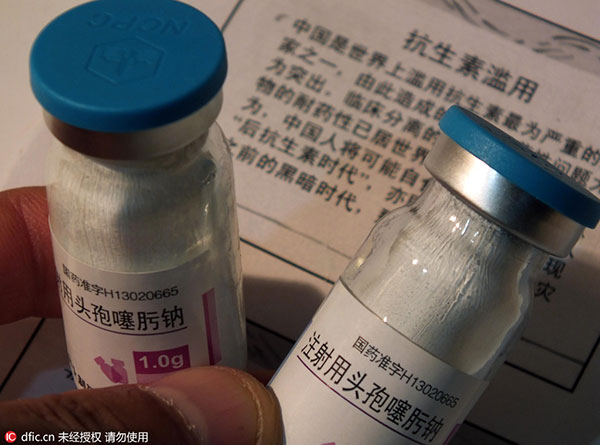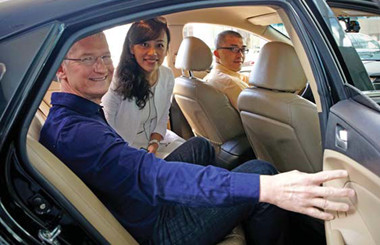Hospitals cut back on antibiotic use
Updated: 2016-05-24 08:04
By SHAN JUAN(China Daily)
|
|||||||||
Review: Resistance could cause 1 million premature deaths a year in country by 2050
 |
|
Antibiotics is shown in this photo taken on Oct 20, 2011 in Yichang, central China's Hubei province. [Photo/IC] |
The use of antibiotics in Chinese hospitals has dropped by 40 percent since the top health authority began to curb their overuse, said a senior expert.
"The Chinese government recognized the challenges and implemented measures starting in 2012 to tackle that," said Xiao Yonghong, a professor at the Institute of Clinical Pharmacology at Peking University and a member of the Rational Drug Use Committee of the National Health and Family Planning Commission.
The measures include stricter control over public access to antibiotics, overhauling their overuse by hospitals, and monitoring of antibiotic resistance.
"Antibiotic use dropped by 40 percent by the end of last year," Xiao said, citing the national surveillance network of drug use linking large hospitals nationwide.
A recent global review by the UK's Lord Jim O'Neill on anti-microbial resistance estimates that by 2050 antibiotic resistance could result in 1 million premature deaths annually in China.
"China could suffer an enormous loss of GDP because of that," said O'Neill, who headed the expert review team.
Antibiotic resistance occurs when a microbe evolves to become more or fully resistant to the anti-microbials that previously could treat it.
According to the report, China uses around half the world's antibiotics, of which 48 percent are consumed by people and the rest are used in the agricultural sector.
Weak regulation on the use of antibiotics in agriculture also further encourages overuse, it said.
Huang Liuyu, director of the Institute for Disease Prevention and Control of the People's Liberation Army, said excessive antibiotic residue might be passed on to humans through meat consumption, increasing the possibility of antibiotic resistance in people.
Also, they could "contaminate" other parts of the world due to increasing international travel and exchange, he said.
O'Neill said: "It's a serious global challenge and thus needs a global solution."
Worldwide, anti-microbial drugs are becoming less effective and the world is not developing enough new ones to keep up, the report said.
Worldwide, anti-microbial resistance by 2050 could be responsible for the deaths of 10 million people a year, the equivalent of 1 person every 3 seconds-more than cancer kills today, it said.
The cumulative economic cost of the world not acting would be around $100 trillion, O'Neill said.
Related Stories
WHO warns of antibiotic overuse 2015-11-16 17:28
Antibiotic found that kills bugs without resistance 2015-01-09 09:56
High antibiotic levels in China's water 2014-05-09 10:11
Antibiotic misuse common in U.S. hospitals 2014-03-06 17:12
Today's Top News
Alibaba expands in Belgium amid protectionism
Eiffel Tower to become rental apartment for first time
Wreckage of crashed EgyptAir plane found at sea
Still learning
EgyptAir denies finding wreckage of missing flight
China urges US to halt close surveillance
Debris found in sea in search for missing MS804
LinkedIn matches refugees with jobs
Hot Topics
Lunar probe , China growth forecasts, Emission rules get tougher, China seen through 'colored lens', International board,
Editor's Picks

|

|

|

|

|

|







